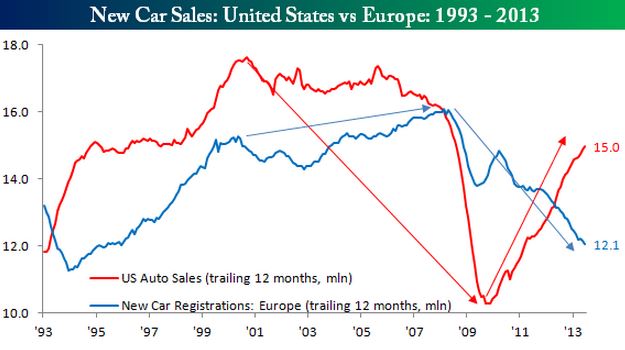This is the second installment of a multi-part series on the new breed of portfolio managers who are helping investors reach their financial goals on Covestor’s investment marketplace.
On Covestor, individuals can invest right alongside these managers and share their performance and expertise.
Today we’ll meet Drew Steinman, who manages the Leveraged Value portfolio.
The portfolio has only been on Covestor’s marketplace for about year. However, Steinman is off to a fast start.
Including fees, the portfolio has posted an annualized return of 79.4% as of July 17 since its inception in July 2013, compared with a return of 22.9% for the S&P 500 over the same period.
Steinman is among the individual investors on Covestor’s platform. He is a Certified Public Accountant (CPA), and for his “day job” he works as a reporting analyst in the healthcare insurance industry. Previously, he worked as an auditor where he examined companies in natural gas, public utilities, telecommunications and manufacturing.
Below is an edited transcript of a recent interview:
Q: How has your accounting and work experience helped your investing?
A: It definitely gives me perspective and I like to dig into companies’ financial statements. As a value investor you need to look well beyond just the quarterly announcements and earnings per share. You really need to tear apart all the financial statements to see more details of what’s going on at the company. Just to give an example, when I first started managing the Leveraged Value portfolio on Covestor, I was investing in natural gas companies. On the surface, things looked bad because the companies were writing down inventories because energy prices were so low. But if you looked at operating cash flow, I believed the companies would be profitable when the write-downs were over.
Q: You seem to favor small-cap companies. Why?
A: It has to do with market efficiency and Wall Street analyst coverage. In finance, everyone learns about the Capital Asset Pricing Model (CAPM) and efficient markets. But I believe there are degrees of efficiency in the market. There is less coverage of small-caps, so they can be less efficient. I think I can find large price variances from what I believe is true value, in small-caps. But it can take a longer period of time to adjust to what I believe is true value. My feeling is that in general, there are smaller spreads to true value in large-cap stocks, but they adjust quicker.
Q: It seems like you manage a fairly concentrated portfolio that focuses on your top ideas?
A: Yes, my goal is to own about 20 stocks, in that range. I do allocate more to stocks that I have the greatest confidence in, although I try to limit any single position to 10% of the portfolio. I feel that it’s better to have fewer stocks and know those companies better. Also, when you hold a lot of stocks, you end up tracking the market fairly closely, especially if you own large-cap stocks. Active managers are supposed to beat the market, not track it. I try to maintain some sector diversification, although I won’t own stocks from every sector. I do try to have at least four or five sectors in the portfolio for diversification purposes.
Q: There are many different “flavors” of value investing. What’s yours?
A: It’s a mix of two main strategies. Most of the time, I’m looking for the “cigar butts” — companies that are very undervalued, not very glamorous, and may have fallen on hard times in the short term. The other strategy I also use, but not as much, is growth at a reasonable price, also known as GARP. Here, I’m looking to buy great companies at a good price.
Q: You can use leverage in your portfolio. How do you approach leverage?
A: Yes, I can use leverage, which is why a margin account is required to follow my portfolio on Covestor. I used leverage during the first six months I was managing the portfolio. I’m not using leverage now. I won’t use leverage if margin rates get over about 5% or 6%. When I was using leverage 2013, it was a combination of what I saw as an undervalued market, and low rates. I understand why leverage can scare some people because performance can be more volatile. I’m not using leverage currently.
Q: What makes you tick as an investor?
A: I’m just a curious person. I’m interested in all sorts of industries and I want to learn as much as possible about all areas of the market. If I meet someone from a particular industry or have a friend that works in one, I like to ask them questions about their experiences. That said, I do hold more insurance companies because I work in that field. Also, I shy away from manufacturing and cyclical companies. Part of the reason is that these companies are more susceptible to downturns and recessions. They are also subject to all kinds of unpredictable input costs, which makes it next to impossible to project earnings.
Q: Some of the portfolio managers on Covestor are Registered Investment Advisers (RIAs) and some are individual investors like yourself. As an individual investor, how do you find time to manage a portfolio?
A: I listen to quarterly conference calls when I’m driving. I read during my lunch break and my day job allows me to listen to Bloomberg Radio. As for placing trades, I place buy and sell limit orders in advance based on my price targets. I put in some hours at night and on the weekends. But for me, the work of investing is enjoyable. I don’t think of it as working.
See Part 1 and Part 3 of this series.
To learn more about investing with the portfolio managers on Covestor, contact our Client Advisers at clientservices@interactiveadvisors.com or 1.866.825.3005. Or you can try Covestor’s services with a free trial account.
Disclaimer: All investments involve risk and various investment strategies will not always be profitable. Neither the information nor any opinions expressed constitutes investment advice and is not intended as an endorsement of any specific portfolio manager. Covestor has over 100 portfolios which can all be comparedhere. Past performance does not guarantee future results.





